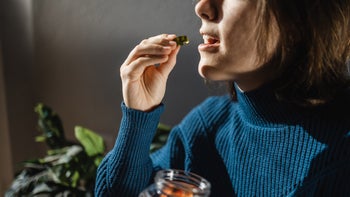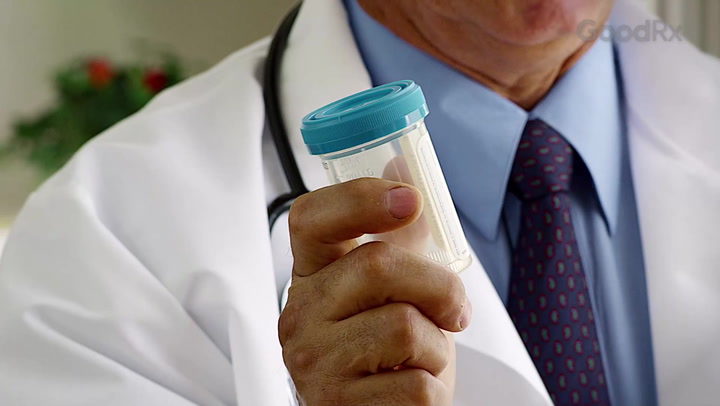
How Long Does Delta-8 THC Stay in Your System? Plus 4 More Delta-8 FAQs
Key takeaways:
Delta-8 THC is a chemical with similar effects to traditional (delta-9) THC. Most delta-8 THC is made in a lab by applying chemicals to CBD (cannabidiol).
Because delta-8 THC is similar to delta-9 THC, it can stay in your system for anywhere from a few hours to several weeks, depending on the dose and how often you consume it. Delta-8 THC is also likely to show up on a drug test.
Delta-8 THC lies in a legal gray area, and it isn’t regulated. So delta-8 THC products can contain residual chemicals and other contaminants. Individual states have started passing laws against delta-8 THC because of this risk.
Table of contents

Delta-8 tetrahydrocannabinol, or delta-8 THC, is popping up everywhere as an over-the-counter (OTC) alternative to traditional cannabis products. You may see delta-8 THC referred to as, “diet weed,” delta-8 CBD, or “weed light.” This is because it works in a similar way as delta-9 THC — the “traditional” form of THC found in cannabis. But delta-8 THC doesn’t seem to be quite as potent as delta-9 THC when it comes to the “high” you feel when you take it.
Most delta-8 THC doesn’t come directly from the cannabis plant. Instead, it’s made by applying chemicals to CBD (cannabidiol). These chemicals change the structure of CBD into delta-8 THC.
Since delta-8 THC is a newer cannabis product, many people don’t know much about it. You may want to know how long delta-8 THC might stay in your system, and if it will show up on a drug test.
Wise use cannabis for pain
THC gummies made for quick relief. Clinician-led guidance always included. Use code TRYEO to get 10% off.


Must be 21 years or older to purchase. Cannabis is not recommended for women who are pregnant or nursing or those who are suffering from bipolar disorder or schizophrenia. Cannabis use may increase risk of falls. Always consult with your doctor before beginning any new medical treatment.
Here, we’ll answer five common questions about delta-8 THC to help you understand more about it.
1. How long does delta-8 stay in your system?
Cannabis products, including delta-8 THC, can stay in your system anywhere between a few hours to a few weeks or more. We don’t have many studies on delta-8 THC. But it is very similar to delta-9 THC (the most common form of THC found in cannabis). So delta-8 is expected to stay in the body for about the same amount of time as delta-9 THC.
If you consume delta-8 products occasionally, it could stay in your system for as little as 2 to 5 days. But with regular use, it could be up to 15 days. And if you have a high amount of body fat, delta-8 THC could stay in your system for as long as 30 days.
This is because cannabinoids (the active ingredients found in cannabis) are stored in your fat cells after you consume them. They’re then slowly released over time. With frequent use, delta-8 THC levels can build up in your fat cells. So it can take longer to clear it from your body once you stop consuming delta-8 THC products.
THC can also remain detectable in your hair for up to 90 days after you consume it.
Keep in mind that these are estimates. Your individual metabolism, as well as how much and how often you consume delta-8, will contribute to how long it stays in your system.
Delta-8 THC: What to know about the risks and possible benefits of this semisynthetic cannabinoid.
The dangers of synthetic weed: With names like K2 and Spice, these products may seem harmless, but they can cause dangerous effects.
Consuming cannabis safely: Learn about safe and responsible cannabis use with this GoodRx guide.
2. Does delta-8 show up on drug tests?
Probably, and new tests are already being developed to test for it directly.
There are several different types of drug tests. Some screen for the presence of cannabinoids of any kind. These types of drug tests would definitely detect delta-8 THC, because it’s a cannabinoid.
Other drug tests are more specific for THC. But even though they’re designed to look for delta-9 THC, it’s likely that delta-8 THC will also cause you to test positive. That’s because the chemical structure of delta-9 THC and delta-8 THC are almost identical. Plus, your body breaks them down into the same compounds (metabolites), which drug tests also detect.
Read more like this
Explore these related articles, suggested for readers like you.
As mentioned, due to the widespread availability of delta-8 THC products sold OTC, new drug tests are being developed to screen for it. This is to help prevent the use of delta-8 THC by people looking for ways to work around court-mandated drug testing.
If you’re concerned about failing a drug test, it’s best to avoid delta-8 products.
3. Is delta-8 THC safe?
There’s no way to know for sure. As mentioned, most delta-8 THC is produced by applying chemicals to hemp CBD. But this process is currently unregulated in the U.S. So there’s no testing or oversight required to make sure these products are safe.
The chemicals used to turn CBD into delta-8 THC may remain in the final product. And other contaminants, such as pesticides, heavy metals, and mold, could also be present. In fact, a 2021 study of delta-8 vape pens showed that of the 27 products studied, none were labeled accurately and 11 had unlabeled contaminants.
The CDC also issued a health warning in 2021 about the dangers of delta-8 THC products.
The best way to consume cannabis safely is to talk with a trained healthcare professional and only purchase products from state-regulated dispensaries. Avoid unregulated OTC products such as delta-8 THC.
4. Is delta-8 legal?
The short answer is: It’s complicated. Due to the Agriculture Improvement Act of 2018 (also referred to as the 2018 Farm Bill), it is legal to grow hemp and use it in OTC products across the U.S. Hemp is a variety of cannabis that contains less than 0.3% THC.
Since most, if not all, delta-8 products are made from hemp CBD, they’re technically legal. But this question of legality has come up again and again over the years, with various government agencies and courts trying to come to a conclusion.
In 2020, the Drug Enforcement Administration (DEA) released a document called the Interim Final Rule. It stated that all synthetically derived tetrahydrocannabinols (including delta-8 THC) are Schedule 1 controlled substances. Schedule 1 substances include illegal drugs (like heroin and ecstasy) that have high abuse potential and don’t have accepted medical use in the U.S. In other words, it seemed that delta-8 THC would be considered illegal under this guideline.
However, in a letter to the Alabama Board of Pharmacy in September 2021, the DEA clarified that cannabinoids in hemp are excluded from the guidelines, and are not considered illegal. This was upheld by the Ninth Circuit Court of Appeals in May 2022. They ruled that because the source of the delta-8 THC in question was hemp, it’s legal as defined by current federal law. But the court acknowledged that this seemed to be a loophole that Congress would be responsible for fixing.
In the absence of clear federal laws surrounding delta-8 THC, many states have decided to take action on their own. Currently, over 15 states have banned or regulated the sale of delta-8 THC products. A few states have allowed for delta-8 THC products, but only if they’re sold in licensed dispensaries and go through regulated testing processes to make sure they are labeled accurately and don’t contain contaminants.
New state laws are being proposed across the country, so it’s best to check your individual state regulations to know if delta-8 is legal where you live.
5. What’s the difference between delta-8 and delta-10?
Delta-10 THC is another cannabinoid that’s made by applying chemicals to CBD. The main difference between delta-8 THC and delta-10 THC is that while delta-8 THC is found naturally in the cannabis plant, delta-10 THC is not. This means delta-10 THC is a synthetic cannabinoid — it’s completely lab made, and not a naturally occurring chemical.
There’s also no human research on delta-10 THC, so we don’t really know how it affects the body and what risks or benefits it may have. But we do know that it’s produced in a similar way to delta-8 THC, so the same risks for contamination and residual chemicals exists for delta-10 products.
The bottom line
Delta-8 THC is a chemical naturally found in small amounts in cannabis. It has similar effects to delta-9 THC, so delta-8 THC can stay in your system for weeks if you consume it often.
Most delta-8 THC products are man-made by applying chemicals to hemp CBD. It’s sold OTC as delta-8 hemp or “weed light;” but make no mistake — it’s still likely to make you feel high. And delta-8 THC will probably cause a positive drug test, too.
Delta-8 THC products are not regulated and may contain residual chemicals and other contaminants. Individual states have started passing laws against delta-8 THC due to these concerns. If you’re concerned about safety, legality, or passing a drug test, it’s probably best to avoid delta-8 THC altogether.
Why trust our experts?


References
Abernethy, A. (2019). Hemp production and the 2018 farm bill. U.S. Food and Drug Administration.
Boos, T. L. (2021). Letter to Donna C. Yeatman. U.S. Food and Drug Administration.
Cary, P. L. (2021). Drug court practitioner fact sheet. National Drug Court Institute.
Health Alert Network. (2021). Increases in availability of cannabis products containing Delta-8 THC and reported cases of adverse events. Centers for Disease Control and Prevention.
Herrington, A. J. (2022). Federal appeals court rules that Delta-8 THC is legal. Forbes.
Marzullo, P., et al. (2020). Cannabidiol as the substrate in acid-catalyzed intramolecular cyclization. Journal of Natural Products.
Meehan-Atrash, J., et al. (2021). Novel Δ8-tetrahydrocannabinol vaporizers contain unlabeled adulterants, unintended byproducts of chemical synthesis, and heavy metals. Chemical Research in Toxicology.
Moeller, K. E., et al. (2017). Clinical interpretation of urine drug tests. Mayo Clinic Proceedings.
Tagen, M., et al. (2022). Review of delta-8-tetrahydrocannabinol (Δ8-THC): Comparative pharmacology with Δ9-THC. British Journal of Pharmacology.
Taylor, M., et al. (2016). Comparison of cannabinoids in hair with self‐reported cannabis consumption in heavy, light and non‐cannabis users. Drug and Alcohol Review.
Turner, A. R., et al. (2024). Marijuana. StatPearls.
U.S. Drug Enforcement Administration. (n.d.). Drug scheduling.
U.S. Drug Enforcement Administration. (2022). 5 things to know about Delta-8 tetrahydrocannabinol – Delta-8 THC.
U.S. Drug Enforcement Administration. (2022). Implementation of the Agriculture Improvement Act of 2018.
Weil, M. (2021). What is Delta-8-THC? Is it safe? The Cannigma.
Keep in mind that cannabis is legal in some states for personal and/or medicinal use, but not in others. Cannabis is still illegal under federal law.





























